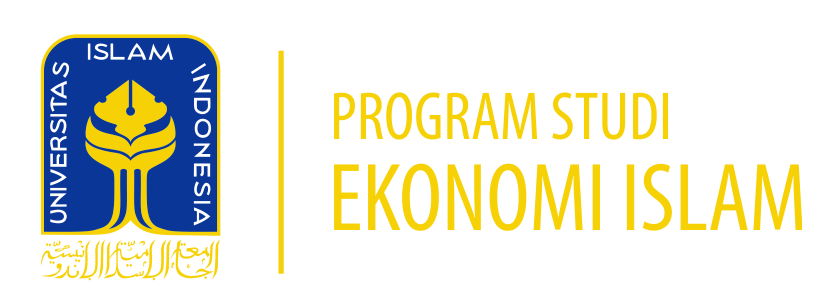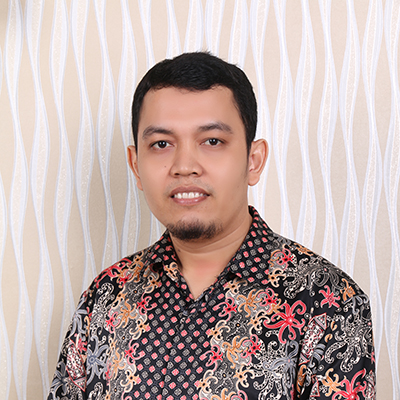Yuli Andriansyah was graduate of Department of Economics, Faculty of Economics and Master of Islamic Studies, Faculty of Islamic Studies, both in Islamic University of Indonesia.
He joined the department in 2007 as administrative staff and then in 2010 as full faculty member.
He teaches Introduction to Microeconomics and Macroeconomics, Islamic Microeconomics and Macroeconomics, and Econometrics.
His current research interests are fiscal policy, Islamic finance, and halal food and industry.
LATEST PUBLICATIONS (5 YEARS)
| NO | TITLE | JOURNAL / PROCIDING | YEAR |
| 1. | Job Satisfaction and Achievement of Maqasid Al-Sharia: A Case Study in Takaful Keluarga Yogyakarta | Advances in Economics, Business and Management Research | 2021 |
| 2. | Role of Government in Keeping Price Stability Through Pure Market Operation From an Islamic Economic Perspective | Advances in Economics, Business and Management Research | 2021 |
| 3. | Financial Performance of Islamic and Conventional Mutual Funds in Indonesia Stock Exchange | Advances in Economics, Business and Management Research | 2021 |
| 4. | The effect of price, product quality and religiosity on purchasing behavior of halal-labeled Sariayu beauty products | Advances in Economics, Business and Management Research | 2021 |
| 5. | The Impact of Halal Label and Social Support on Purchasing Behavior of Imported Instant Noodles | Advances in Economics, Business and Management Research | 2021 |
| 6. | A Few Preliminary Reflections on Religious Studies and Covid-19 | Millah: Jurnal Studi Agama | 2021 |
| 7. | Models of Helping, Happiness, and Spiritual Serenity among Indonesian and Chinese Students | International Journal of Innovative Research and Scientific Studies | 2022 |
| 8. | Non-technical dimensions of communal wastewater treatment plant sustainability in peri-urban Yogyakarta, Indonesia | F1000Research | 2022 |
| 9. | Gratitude, Optimism, Religiosity, and Subjective Well-Being among Asthma Patients in Yogyakarta, Indonesia | International Journal of Innovative Research and Scientific Studies | 2022 |
| 10. | The Effect of a Communal Wastewater Treatment Plant (CWWTP) on The Quality of Groundwater: A Case Study in Indonesia | Water | 2022 |
| 11. | How Religious Leaders around the World Are Responding to the Covid-19 Pandemic | Millah: Jurnal Studi Agama | 2022 |
| 12. | Ethical Dimensions of the Covid-19 Pandemic: Some Religious Studies Point of View | Millah: Jurnal Studi Agama | 2022 |
| 13. | The Current Rise of Artificial Intelligence and Religious Studies: Some Reflections Based on ChatGPT | Millah: Journal of Religious Studies | 2023 |
| 14. | Exploring the Adoption of Digital Wallets among Islamic Millennials in Yogyakarta, Indonesia Using an Extended UTAUT Model: The Role of Islamic Consumption Ethics | Journal of Theoretical and Applied Information Technology | 2023 |
| 15. | The Role Artificial Intelligence in Modern Banking: An Exploration of AI-Driven Approaches for Enhanced Fraud Prevention, Risk Management, and Regulatory Compliance | Reviews of Contemporary Business Analytics | 2023 |
| 16. | Analysis of Fatwas by the National Sharia Board-Indonesian Council of Ulama on the Stock Market | Millah: Journal of Religious Studies | 2023 |
| 17. | A Journey to Inclusion in Scopus: Lessons Learned from Millah: Journal of Religious Studies | Millah: Journal of Religious Studies | 2023 |
| 18. | Factors Influencing Image and Loyalty of Halal Tourism Destinations in Yogyakarta, Indonesia | Unisia | 2023 |
| 19. | Performance measurement analysis of Sharia commercial banks in Indonesia with Maqashid Index and Sharia Conformity and Profitability (SCnP) | Journal of Islamic Economics Lariba | 2023 |
| 20. | Determinants of Murabahah Margin Income in Indonesian Islamic Commercial Banks, 2013–2018 | Unisia | 2023 |
| 21. | Corporate Governance and Earnings Management: Insights from Jakarta Islamic Index Firms | Unisia | 2023 |
| 22. | Determinants of Profitability in Indonesian Islamic Banks: Insights on Financial Performance | Unisia | 2023 |
| 23. | Determinants of profitability in Indonesian Islamic banks: Financial and macroeconomic insights | Journal of Islamic Economics Lariba | 2023 |
| 24. | Product development strategies in Yogyakarta’s Muslim fashion industry: Innovation and ethics | Journal of Islamic Economics Lariba | 2023 |
| 25. | Indonesia on Palestinian Destiny: Perspectives from the Government and Scholars | Millah: Journal of Religious Studies | 2023 |
| 26. | Factors influencing user interest in using Sharia-compliant Fintech services: A case study of SyarQ in Yogyakarta, Indonesia | Journal of Islamic Economics Lariba | 2024 |
| 27. | Islamic business ethics in Muslim fashion store: A study at 3 Nur Shop, Pattani, Thailand | Journal of Islamic Economics Lariba | 2024 |
| 28. | Application of Islamic business ethics in online marketplace: A study among Bukalapak users in Yogyakarta, Indonesia | Journal of Islamic Economics Lariba | 2024 |
| 29. | Humanitarian Aid from the Islamic Mass Organizations in Indonesia to Palestine | Millah: Journal of Religious Studies | 2024 |
| 30. | Enhancing Sharia compliance: Evaluating supervisory roles in a rural Islamic bank in Yogyakarta, Indonesia | Journal of Islamic Economics Lariba | 2024 |
| 31. | Determinants of Profit Growth in Indonesian Islamic Banks: Insights from Financial Ratios | Unisia | 2024 |
| 32. | Factors Motivating Muslims to Pay Zakat: A Narrative Review Based on the Scopus Database | Journal of Contemporary Applied Islamic Philanthropy | 2024 |
| 33. | The effect of corporate social responsibility, activities ratio, and capital structure on the profitability of companies listed in the Jakarta Islamic Index | Journal of Islamic Economics Lariba | 2024 |
| 34. | Macroeconomic Impacts on Islamic Bank Profitability: Evidence from Indonesia’s Dual Banking System | Unisia | 2024 |
| 35. | Enhancing Communicative Arabic Teaching: Evaluating the Al-Arabiyah Baina Yadaik Model | Journal of Educational and Social Research | 2025 |
| 36. | Mapping the Landscape of Fiscal Discipline: A Four-Decade Bibliometric Analysis of Global Scholarship (1981–2024) | Unisia | 2025 |
| 37. | An exploratory comparative analysis of fiscal discipline in Islamic economics: Integrating ethical governance with sustainable financial practices | Journal of Islamic Economics Lariba | 2025 |
LATEST NATIONAL PUBLISHING EXPERIENCES
| NO | JOURNAL | PUBLISHER | INDEXATION |
| 1. | Editor in Chief: Millah: Jurnal Studi Agama | Program Magister Ilmu Agama Islam, Fakultas Ilmu Agama Islam, Universitas Islam Indonesia, Yogyakarta | Scopus, ScimagoJR, Sinta 1, EBSCOHost, Index Copernicus International |
| 2. | Editor in Chief: Journal of Islamic Economics Lariba | Program Studi Ekonomi Islam, Fakultas Ilmu Agama Islam, Universitas Islam Indonesia, Yogyakarta | Sinta 2, Index Copernicus International |
| 3. | Editor: Indonesian Journal of Interdisciplinary Islamic Studies | Program Doktor Hukum Islam, Fakultas Ilmu Agama Islam, Universitas Islam Indonesia, Yogyakarta | Sinta 4, Index Copernicus International |
| 4. | Editor in Chief: Unisia | Universitas Islam Indonesia, Yogyakarta | Index Copernicus International |
| 5. | Editor: Economica: Jurnal Ekonomi Islam | LP2EI, Fakultas Ekonomi dan Bisnis Islam, Universitas Islam Negeri Walisongo Semarang | Sinta 2 |
| 6. | Editor: Tasharruf: Journal Economics and Business of Islam | Fakultas Ekonomi dan Bisnis Islam, Institut Agama Islam Negeri Manado | Sinta 4 |
| 7. | Reviewer: Khazanah Sosial | UIN Sunan Gunung Djati, Bandung | Sinta 2 |
| 8. | Reviewer: Cakrawala: Jurnal Studi Islam | Fakultas Agama Islam, Universitas Muhammadiyah Magelang | Sinta 3 |
| 9. | Reviewer: Volksgeist: Jurnal Ilmu Hukum dan Konstitusi | Fakultas Syariah Universitas Islam Negeri Profesor Kiai Haji Saifuddin Zuhri Purwokerto | Scopus, Sinta 3 |
| 10. | Reviewer: Al Amwal | Jurusan Perbankan Syariah Fakultas Syariah dan Ekonomi Islam IAIN Syekh Nurjati Cirebon | Sinta 4 |
| 11. | Reviewer: Jurnal Baabul Al Ilmi | Fakultas Ekonomi dan Bisnis Islam, Institut Agama Islam Negeri Bengkulu | Sinta 5 |
| 12. | Reviewer: Indonesian Journal of Islamic Economics and Business | Fakultas Ekonomi dan Bisnis Islam, Universitas Islam Negeri Sulthan Thaha Saifuddin Jambi | – |
| 13. | Editorial Advisory Board: Az-Zarqa’ Jurnal Hukum Bisnis Islam | Faculty of Sharia and Law, UIN Sunan Kalijaga Yogyakarta | – |
LATEST INTERNATIONAL PUBLISHING EXPERIENCES
| NO | JOURNAL | PUBLISHER | INDEXATION |
| 1. | Academic Editor & Reviewer: SAGE Open | SAGE Publications, California, United States | Scopus Q2, SSCI Web of Science Q2 |
| 2. | Reviewer: British Food Journal | Emerald Group Publishing, Bradford, United Kingdom | Scopus Q1, SCIE Web of Science Q2 |
| 3. | Reviewer: Mental Health, Religion and Culture | Taylor & Francis, Oxfordshire, United Kingdom | Scopus Q2, ESCI Web of Science |
| 4. | Reviewer: Health Psychology Open | SAGE Publications, California, United States | Scopus Q2, ESCI Web of Science |
| 5. | Reviewer: Journal of Language and Education | National Research University Higher School of Economics, Moscow, Russia | Scopus Q2, ESCI Web of Science |
| 6. | Reviewer: Journal of Social Studies Education Research | Association for Social Studies Educators, Turkey | Scopus Q2 |
| 7. | Reviewer: International Journal of Business and Society | Universiti Malaysia Sarawak, Sarawak, Malaysia | Scopus Q3, ESCI Web of Science |
| 8. | Reviewer: Journal of King Abdulaziz University, Islamic Economics | King Abdulaziz University Scientific Publishing Center, Jeddah, Saudi Arabia | Scopus Q4 |
| 9. | Reviewer: Theology and Science | Taylor & Francis, Oxfordshire, United Kingdom | Scopus Q1, SSCI Web of Science |
| 10. | Reviewer: Journal of Islamic Law | Harvard Law School, Harvard, United States | |
| 11. | Reviewer: Dialogues in Health | Elsevier B.V., Amsterdam, Netherlands | Scopus Q3. DOAJ, PubMed Central |


